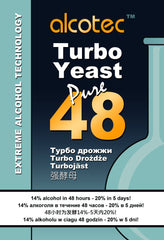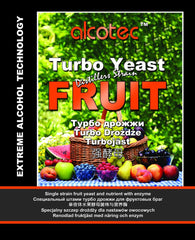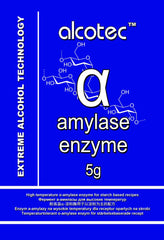
Extreme Alcohol Technology
SHOP FOR ALCOTEC TURBO DISTILLING YEAST:
All About Distillers Yeast
What is Yeast?
Yeast is a single cell organism which multiplies vigorously in the presence of oxygen and then after consuming all the oxygen will convert fermentable sugars into alcohol. Without yeast we could not produce alcoholic beverages or ethanol fuel.
Distillers Yeast
Distillers yeast is a particular species of yeast (Saccharomyces cerevisiae) that has a particularly strong ability to metabolize sugar and produce alcohol as a by-product. Distillers yeast also has a major impact on the flavor of your final spirit. The flavor and aroma of whiskey, rum and moonshine (or lack of such in the case of vodka) are highly influenced by the distillers yeast in the fermentation process and thus choosing the proper yeast has a significant impact of the quality of your distilled spirit. All distillers yeast is definitely not the same.
Distillers Yeast Strains
Within the species of Saccharomyces cerevisiae there are many different strains that will have significantly different performance characteristics and produce diverse flavor congeners. Think of it in the context of humans. We are all a part of the same species (Homo sapiens) but we have great diversity in our species. Each of us is different in many ways. Likewise each strain of distilling yeast is different. For example the distillers yeast strain used in Alcotec 48 products has the capability of fermenting up to a very high alcohol percentage (20+%) while producing very low volatiles. In contrast ordinary bread yeast strains of Saccharomyces cerevisiae have the ability to produce maximum CO2 in order to cause dough to rise, but they typically die off at far lower levels of alcohol while producing high levels of volatiles (bad flavor congeners and other chemical compounds). The manufacturer of Alcotec also uses strains that produce specific flavor profiles for their whiskey, rum and fruit turbo varieties. The generic bulk packs of distillers yeast that some retailers sell could actually be any one of a variety of strains but usually is of the type used for making ethanol fuel (a strain with high alcohol tolerance but with little regard for taste). All yeast should be used promptly once the package is opened as exposure to air will kill the yeast cells within a few weeks of exposure.
Turbo Yeast
Turbo yeast is a specific blend and quantity of distillers yeast combined with highly complex, chemically defined, macro and micro nutrients designed to maximize the speed and quality of fermentation. Turbo yeast will perform dramatically better than distillers yeast by itself. Yeast has specific nutritional needs to thrive and perform to its maximum potential. Lack of these nutrients stresses the yeast cells causing them to produce less alcohol and more volatiles. Refined sugar contains only sucrose and none of the nitrogen and vitamin nutrients required to support yeast activity. Grain and fruit both contain some of these nutrients but not all. The development of yeast nutrition is an advanced science. Hambleton Bard Ltd, the manufacturer of Alcotec turbo yeasts, uses its lab to constantly refine the technology of getting the most out of distillers yeast. This is not easily duplicated at the distiller or retailer level. Private store mixture turbo yeasts rarely have undergone the development and testing necessary to produce a top quality turbo yeast formula. Large scale distilleries have long understood how to use yeast plus nutrition to achieve desired results. The availability of Alcotec turbo yeast now gives the hobby and small scale distiller the ability to produce results that often exceed the big distilleries.
Turbo Yeast Varieties
Turbo yeast is very convenient for hobby and other small batch distillers. Alcotec has specific turbo yeast varieties tailored for almost every application including but not limited to:
- Alcotec 48 – Temperature tolerant high alcohol formulation capable of fermenting a sugar wash to 14% in 48 hours or 20% in 5-6 days.
- Alcotec 24 – Temperature tolerant yeast capable of 14% in just 24 hours.
- Alcotec Whiskey Turbo – Single culture whiskey strain plus nutrition plus glucoamylase.
- Alcotec Rum Turbo – Yeast strain to best promote fine rum flavors plus glucoamylase.
- Alcotec Vodka Turbo – Very pure fermenting yeast strain plus glucoamylase.
- Alcotec Fruit Turbo – Yeast strain that retains fruit flavor qualities plus pectinase.
- Alcotec 200 – Extremely high temperature tolerant yeast strain with ability to be stacked (use of multiple packets) to ferment batches up to 200 liters (53 gallons).
- Alcotec ReStart – Used to restart stuck fermentations. Has the ability to be added to a ferment that already has 7-8% alcohol present.
You’ll find more detailed descriptions of these products and more in the product section of this web site.
Enzymes Used with Turbo Yeast
Glucoamylase (often called amyloglucosidase) enzyme is used in some formulations to break long chain sugars into short chain sugars to aid the yeast in its ability to turn these into alcohol. Glucoamylase is typically used in ferments containing grain but also can be beneficial in breaking down dextrins in ferments containing molasses. Grain ferments also require treatment with Amylase enzyme prior to fermentation. Amylase works at a higher temperature than yeast can survive therefore it is always sold separately and is never contained in any turbo yeast package. Alcotec Fruit Turbo contains Pectinase enzyme which breaks fruit down to aid in its fermentation.
Turbo Yeast Packaging
In order to maintain its long shelf life turbo yeast packaging needs to be packaged in a relatively thick laminated film with a layer of foil. The package film must be both a moisture and oxygen barrier and of sufficient strength and weight to resist pin holes that would penetrate the barrier. You will recognize quality packaging by both its feel and a heat formed seal around all four edges. If you see a turbo yeast product packaged in what looks more like a potato chip bag then it is possible that packaging will not protect the yeast for its full shelf life. If a manufacturer is willing to cut corners in the quality of their packaging to save a few pennies you can imagine what corners they may have cut in the quality of their formula or the quality of the yeast and other contents.
Turbo Yeast and the Distilling Community
The internet is filled with postings from people who can attest to getting great results using turbo yeast and yet there are many others who claim to have had bad results. How is it that people using the same products get differing results? The answer is likely stressed yeast. When yeast is stressed it produces excessive amounts of chemical compounds and flavors that just don’t taste very good. Any yeast used can be stressed to create taste and smell problems but the question is rarely asked about any yeast other than turbo yeast. Turbo yeasts also get unfairly dumped into one single category as if all were the same or if all brands were the same. The real culprit is less likely to be the turbo yeast (although there are some cheap poor quality brands out there) and more likely to be the procedures and practices of the individual distillers. The following are the common problems and what may really be causing them:
- Sulphur – It is well known that Sulphur gives a flavor and smell of rotten eggs. This is definitely not a characteristic one seeks in fine handcrafted spirits. Sulphur naturally gets removed from the mash or wash by CO2. The more vigorous your fermentation is the less sulphur will be present when the fermentation has ended. Sluggish fermentations are often caused by temperature issues. Pitching the turbo yeast before the wash has cooled to the temperature specified on the package or pitching after it has cooled too much both can cause a sluggish start to the fermentation. It is very important to maintain the proper fermentation temperature steady throughout the fermentation. Copper is also great for removing Sulphur. Stills made from all stainless steel have no ability to remove sulphur.
- Fusel Alcohols – These are the things that cause those wicked hangovers even when you thought that you had not had that much to drink. Again keeping your ferment as close as possible to the recommended temperature will keep these to a minimum. Fusel alcohols can and should be removed during the distillation process by simply cutting the tails. At the end of a run when the distillate starts to become bitter simply stop collecting or collect those tails in a separate container. Tails make a great cleaning solvent but should not be drunk.
- Phenols – Phenols produce a plastic or medicinal taste. To avoid these start off by not using chlorinated water. You should also make sure all the fermentation equipment is clean and preferably sterilized and use an air lock during fermentation. Wild yeast and bacterial contamination will contribute to phenol production.
- Acetaldehyde – Has the smell of green apples and also contributes to bad hangovers. Acetaldehyde exists in high concentrations when a mash is not allowed to finish fermentation. Using turbo yeast which typically ferments faster than plain distillers yeast helps reduce the fermentation time needed. Acetaldehyde can also be produced when a wash or mash is aerated in the late stages of the fermentation or if it is allowed to sit for a long period of time (more than a week) after all fermentation is finished. Acetaldehyde has a low boiling point so by properly separating the foreshots and heads you can avoid much of the acetaldehydes in your distillate. Knowing how and when to properly make your cuts is a big part of distilling great spirits.
So in reality turbo yeast is rarely the cause of flavor problems and should instead be seen as what it is – a giant step forward in fermentation technology.
Basic Conditions that All Distillers Yeast Needs to Thrive
- Adequate Feed Stock – Ultimately the percentage of alcohol that any strain of distillers yeast can produce (within the limits of the particular strain) is determined by the available fermentable sugars in the wash or mash. Both grains and fruits should be treated with enzymes to release their sugars. While it is impossible because of the many variables involved to provide a rule of thumb on how much alcohol a particular quantity of grain or fruit can potentially produce such is not the case with refined sugar. One pound of sugar added to one gallon of water has the potential of 7% alcohol ABV.
- Correct and Even Temperature – The correct temperature range for the yeast strain you are using should be printed on the package as is always the case with Alcotec turbo yeasts. It is important to keep the temperature within that range to keep the yeast cells from dying and to prevent them from becoming stressed.
- Proper pH – The pH of your wash or mash should be between 4.0 and 4.5 prior to fermentation. You can adjust the pH using by using citric acid or fresh lemons.
- Oxygen – Oxygen is an important component to the beginning of the fermentation process as its presence is required for the yeast to reproduce. When the yeast has consumed the oxygen it will cease to reproduce and begin to create alcohol. You can aerate your wash or mash by stirring it vigorously.
- Nutrients – Yeast is a living organism and as such requires nutrients to survive. Distillers yeast simply cannot survive on sugar alone. If you were doing a mash of malted grain and were seeking less than 10% alcohol there would be enough nutrients to keep the yeast alive. But if you are like most hobby distillers and want more alcohol from each run you must add nutrients. This is where turbo yeast makes it easy on you as all necessary nutrients in the proper quantities are already included in the package.
Use of Turbo Yeast for Batch Quantities of Differing Size
Most turbo yeast is prepackaged for a batch size of 6.6 U.S. gallons (25 Liters). It can be stretched to a batch up to 8 gallons but the fermentation will take longer and result in a proportionally lower alcohol potential. Conversely using a whole package in a somewhat smaller batch (say 5 gallons) should result in a quicker fermentation but the alcohol percentage cannot exceed the potential of the yeast strain being used. If attempting to use a partial package always reseal the package immediately squeezing out any air from the package and then keep refrigerated. Use remaining contents within 3 to 4 weeks.
History of Turbo Yeast
It has not been documented just when mankind learned that nutritional supplementation improved the performance of distillers yeast. However Gert Strand of Sweden is frequently credited with producing the first true turbo yeast sometime in the 1980’s. However by 1996 competitors had surpassed this product’s quality and he began selling turbo’s manufactured by others. Much of his turbo yeast now comes from Hambleton Bard Ltd, the makers of the Alcotec line of turbo yeasts which have become the dominant brand in most of the world. Prior to now the distribution of Alcotec turbo yeasts has been limited in the USA but is now available for purchase online at very competitive prices from VGR Distributing on this website.



